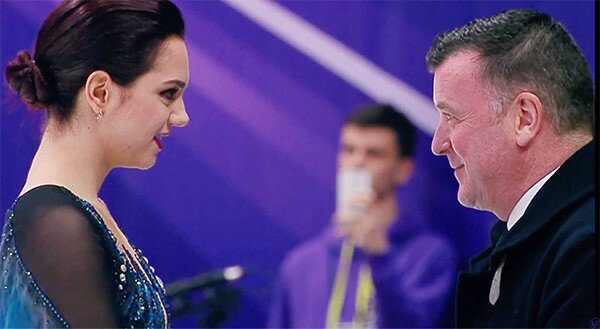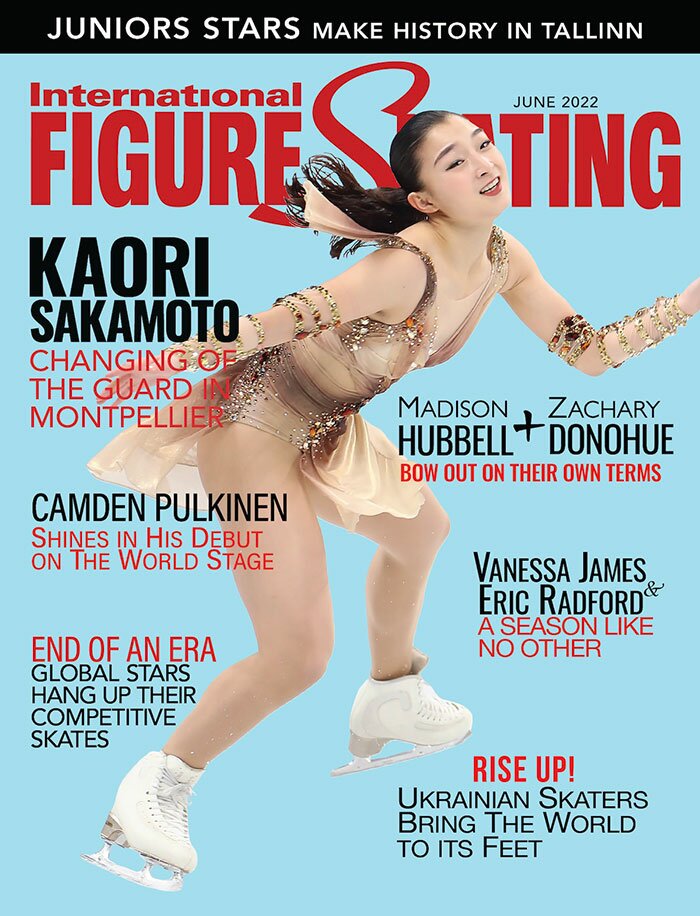

Team Russia gave homeland fans many reasons to cheer when they claimed nine of the 12 top spots in all four disciplines at 2019 Rostelecom Cup on Friday.
Evgenia Medvedeva of Russia put the demons of the past far behind her today, laying down a clean short program for the first time this season and taking the lead over her teammate and rival, Alexandra Trusova.
Medvedeva played it smart in her performance to “Exogenesis Symphony Part III” by Muse, switching out the triple Lutz in the combination — for which she has had numerous under-rotation calls — for a triple flip. As she left the ice and was congratulated by her coach Brian Orser, she uttered just one word: “Finally!”
“I am happy with my skate because it finally worked out the way it should,” said the 19-year-old who earned a personal best score of 76.93. “I hope that everyone has seen my work and Brian is happy. It was the right decision (to return to the triple loop). I’ve done that before and every time I did it, my points went up.”
When asked how long she imagines she can compete at a high level, Medvedeva responded: “Three years ago, I couldn’t imagine what my life would be like. I didn’t know where I would be on the eve of my 20th birthday. I could not have imagined that I would be in Canada.”
Orser said Medvedeva was inspired being back in Russia with familiar surroundings along with her fans. “When she skated the short program in Canada, she was not herself. We had to go through a difficult 24 hours. I believe that she deserved today’s performance and her high result. I am sure this will be a turning point for her. I told her that she was a fighter and should continue to fight. Now she needs to perform a long program better than what she did in Canada.”
Trusova also laid down a clean performance and actually won the technical by 0.02 of a point over Medvedeva. But the second mark fell short of that of her rival and Trusova sits in second place with 74.21 points. “There are still mistakes I need to fix and I hope I’m going to do everything tomorrow (in the free),” the 15-year-old said in reflection. “In practice this morning, I was still doing Lutz-loop (combination), but afterwards I was told to do a Lutz-toe today.”
Despite a hard fall on the a triple toe loop on the backend of the combination she attempted, Mariah Bell still managed the third best program of the day, earning 67.11 points for her efforts. She admitted to being a little disappointed with her performance, adding that “regardless of where I place or how many points I get, I always feel best if I go out and skate the best I can — and that didn’t happen today.”
Swiss miss Alexia Paganini celebrated her 18th birthday with a fourth place finish in the short program and a personal best score of 65.12. Ekaterina Ryabova of Azerbaijan finished fifth (64.01 points) ahead of Japan’s Satoko Miyahara who scored zero points on the opening Lutz and landed in sixth with 63.09.
What Medvedeva and Trusova had to say about ladies and men competing against each other.
THE MEN
In an unexpected turn of events, it was the Russian men who claimed the top three spots after the short program, led by Alexander Samarin.
Samarin, who skated the last of the three performances to “Blues for Kook” (Canada’s Nam Nguyen and Vladimir Litvintsev of Azerbaijan also used the same music) came out on top despite a fall on a quad flip. Though he was the third man in the field of 12 to fall on that jump (Japan’s Shoma Uno and Alexei Krasnozhon of the U.S. were the other two), he fared better overall than his rivals, closing out the day with 92.81 points. “First of all I want to thank the crowd for their support, I really enjoyed skating here. There were mistakes in the short program, but the competition is not over yet,” said Samarin who needs a top finish at this competition to qualify for the Grand Prix Final. If he achieves that goal he will be the first man from Russia to qualify.
Dmitri Aliev finished second with an almost clean performance and 90.64 points. He admitted there were some errors, including the opening Lutz in combination which should have been a quad. “Overall I’m pleased, but I would have liked to open up more in the step sequence and to make the program brighter,” the 20-year-old explained. “The choreographers gave this music to me and I watched the opera on YouTube. I really liked how they played on stage and I wanted to bring that to the ice.”
Makar Ignatov landed in third in his Grand Prix debut, also with a personal best score (87.54). “I did not expect to be in the top three. I was just happy that I showed everything that I can do, all the elements. The rest does not depend on me.” The skaters ranked three to six are separated by less than one point. Uno sits in fourth with 87.29, Deniss Vasiljevs is in fifth with 87.08, and Nguyen ranks sixth with 87.01.
What the top two men from Russia had to say when asked how they would feel competing against Trusova.
ICE DANCE
As expected, Victoria Sinitsina and Nikita Katsalapov of Russia twizzled to the top of the standings in the rhythm dance. The duo, who are coached by Alexander Zhulin and his team, earned a personal best score of 86.09 for their upbeat performance to “Singin’ in the Rain.”
“The support of the home crowd was incredible. You don’t feel any tiredness but just have fun out on the ice,” said Katsalapov. “But this is not the very best that we can do — we’re not even halfway through the season. We’ll continue to work, but now we’ll take a deep breath and get ready for the free dance.”
Canada’s Piper Gilles and Paul Poirier danced into second with a sharp and concise performance to “Mack and Mabel,” earning 82.56 points, just 0.02 of a point shy of their score at Skate Canada three weeks earlier.
“There were a few sticky moments here and there as we went through the performance. We spent a lot of time after Skate Canada trying to focus on the speed of the program, just getting all the movements really big and taking up more space and I think that’s been really effective,” Poirier explained. “We felt like character of the program really projected out from us and was able to reach the top, top of the arena.”
Spain’s Sara Hurtado and Kirill Khaliavin, who are also coached by Zhulin, finished third with 72.01 points. “It was a lot of fun for us to skate in Moscow. It now feels like a second home to us,” said Hurtado. “In our program, we felt that the work we’ve put in since Skate Canada is starting to show. We still have to fix some little things in the technical aspect of the program, but it feels like a good starting point for the next competitions and to look for that personal best in the future.”
Natalia Kaliszek and Maksym Spodyriev of Poland sit in fourth with 69.97 points ahead of Lithuania’s Allison Reed and Saulius Ambruvelicious (69.79). Anastasia Shpilevaya and Grigory Smirnov of Russia finished sixth with 67.04 points.
THE PAIRS
Three Russian pairs teams captured the top spots in the pairs short. In a repeat of their result at Skate Canada, Aleksandra Boikova and Dmitrii Kozlovskii of Russia captured the lead in the short program and are now just one step away from a trip to the Grand Prix Final.
Though Kozlovskii took a spill in the warm up and collided with the boards, he and Boikova laid down a solid short program and true to their music, did it “My Way.” The duo earned a new personal best with 80.14 points.
Kozlovskii noted it was a long day for the teams in the final flight , which started with an early morning practice session and ended with the final event on Friday night. “We’re happy with how everything went, but it would not be right to say anything specific about today because tomorrow will be the main day,” he said. When asked about the fall, he simply replied: “The ice is slippery.”
Evgenia Tarasova and Vladimir Morozov skated into second with 76.81 after Morozov lost his footing in the step sequence and a mistake on the final spin. “Overall, we did all our elements but obviously there were some errors in the end that affected the impression of our program,” he admitted.
Ksenia Stolbova and Andrei Novoselov, who made their international debut at this competition, rounded out the top three teams with 68.74 points. “It’s very cool, beyond words. Honestly, I didn’t expect that there would be so many emotions,” said Stolbova. “We’re very happy that we finally are competing and to be here at the home event. As for the performance, there were positive and negatives to it.”
Minerva Fabienne Hase and Nolan Seegert of Germany are hot on the heels of the third Russian team with 67.74 points. Canada’s Evelyn Walsh and Trennt Michaud sit in fifth (62.76).
RELATED CONTENT:
2019 Grand Prix Series Recaps
Russian Team Strike Gold at Rostelecom Cup



